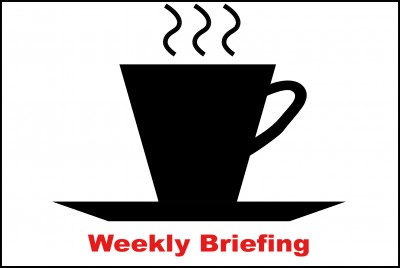Weekly Briefing: Diplomacy and State Visits in Vienna
Read about the newest developments in Diplomacy in Vienna and Austria. The Dutch Royal Couple visited Austria and International Organizations in Vienna released important publications. The consequences of the Russo-Ukrainian War are making themselves felt in security issues and are changing people's lives in Vienna as well. Further, the newest developments in the Iran Nuclear talks raise hopes. The Find out more about this week's developments.
 Take five minutes to catch up on this week’s essential news! / Picture: © Wikimedia Commons / Filip Nohe [CC BY-SA 2.0 (https://creativecommons.org/licenses/by-sa/2.5/deed.de)], modified and edited
Take five minutes to catch up on this week’s essential news! / Picture: © Wikimedia Commons / Filip Nohe [CC BY-SA 2.0 (https://creativecommons.org/licenses/by-sa/2.5/deed.de)], modified and edited
Russo-Ukrainian War
The Russian Invasion of Ukraine is also frightening for other Eastern-European countries. One of them has its own troubles, with the gone rogue territory of Transnistria, highly influenced by the Kremlin, namely Moldova.
Specialty foods such as vodka, buckwheat, and chocolate are available in Vienna's Russian groceries. Since Moscow invaded Ukraine, Austrian-Russian traders have been worried about import difficulties and hostility.
The U.S. company Moody’s announced in New York that it was concerned with interest payments on two government bonds that had not been received by creditors even after a default period of 30 days had expired.
The Austrian authorities have frozen the assets of 1.5 billion euros belonging to Russian oligarchs since the beginning of the war in Ukraine.
Iran Nuclear Talks
EU Foreign Affairs Commissioner Josep Borrell visited Tehran and announced that Iran wants to resume the stalled negotiations on the international nuclear agreement in the coming days.
International Organizations in Vienna
The United Nations Office on Drugs and Crime released its annual World Drug Report. The Report highlights new trends on cannabis post-legalization, environmental impacts of illicit drugs, relations between drug markets and conflict zones like Ukraine, and drug use among women and youth.
This week, the Organisation of Petroleum Exporting Countries (OPEC) presented its Annual Statistical Bulletin (ASB) 2022. This report, which presents a large number of statistics and data on oil market developments in recent years, is the organisation's most important publication alongside the World Oil Outlook.
Diplomacy and Politics in Vienna, Austria and the World
The Dutch royal couple, His Majesty Willem-Alexander, King of the Netherlands, and Her Majesty Máxima, Queen of the Netherlands traveled to Vienna for a state visit. The three-day visit is mainly about strengthening bilateral relations between Austria and the Netherlands and the effects of the Russian Invasion of Ukraine on Europe.
The newly created "Israel Friendship Award" was presented for the first time last week in Vienna to individuals and institutions that promote excellent relations between Israel and Austria. The winners were the Austria-Israel Academic Network Innsbruck and the Austrian former football coach of the Israeli national team, Andreas Herzog.
In the Netherlands, a new Holocaust museum is currently being constructed, which will become a milestone in European remembrance. The Austrian Federal Chancellery is providing 400,000 euros to support the construction of this memorial. Austria sees this support as a sign of its understanding of the Netherlands' special historical responsibilities.
October 9 will be the date for the election of the Federal President. Although the election is relatively close, no real campaign has yet begun. Most parties have not even nominated candidates. The incumbent president Alexander Van der Bellen announced to run again.
The President of Botswana, Mokgweetsi Masisi, recently visited Austria's Federal Chancellor Karl Nehammer. Masisi was in Vienna to strengthen bilateral relations between the two countries and to discuss the maintenance of food security against the backdrop of the war in Ukraine.
Last week at the European Council and the EU-Western Balkans Summit, the Federal Chancellor of Austria, Karl Nehammer, demanded that the countries of the Western Balkans be offered fair prospects of potential EU accession. Among other things, he made it clear that accession negotiations for Bosnia would be possible as soon as it had fulfilled the reform points set by the EU.
Newest Developments in Austrian Economic Policies
According to the Austrian Institute of Economic Research (WIFO), the global economic slowdown, which mainly affects industry, has dampened Austria's economic outlook. This downturn is only dampened by tourism, which has recovered better than expected since the Covid-19 pandemic.
In order to cope with the acute shortage of skilled workers in Austria, access to the Austrian labour market is to be facilitated for foreign workers in the future. The application procedure is to be made easier and the criteria for obtaining the Red-White-Red Card are to be reduced.
What Else Happened This Week?
From 1 July, new roaming regulations will come into force in the EU. These are designed to make it easier for EU citizens to use mobile data and make calls from abroad to home. Launched in 2017, the project is now being extended for another 10 years and is expected to bring significant benefits for businesses and EU citizens.
The leadership of the Islamic Religious Community of Austria (IGGÖ) is becoming more female. With the social-care assistant Mashaer Ali Hamad, four of the 15 members of the highest administrative body, the Supreme Council, will be women in the future.



